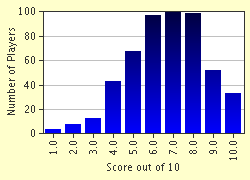Quiz Answer Key and Fun Facts
1. The leading rusher in the NFL in 1982 had 786 yards, the lowest winning total since 1946. Why?
2. Of the following coaches, all of whom took their first NFL head coaching assignment in the 1980s and went on to win Super Bowls, who had the worst record in his first season?
3. Heading into the 1980 season, people were calling me a washed up quarterback. I'd won the Heisman Trophy in college, and Rookie of the Year in the NFL, then it was all downhill after that. I didn't play in 1978. In 1979, I threw 15 passes all season. Then 1980 came around, and all of a sudden, I was a Super Bowl MVP and had six more seasons to look forward to, not to mention one more Super Bowl ring. Who am I?
4. Which of the following statements is not true about kicker Mark Moseley?
5. After years of demands from fans, NFL owners in 1986 made a rule change that took some of the controversy out of officiating. Think for a moment about what that was, then after further review, see if your choice stands. What rule change below became effective in 1986?
6. Who was Frank Kush, and what role did he play in John Elway signing with the Denver Broncos in 1983?
7. Three of the choices below are related. Which one doesn't go with the other three?
8. Why did the Buffalo Bills change their helmet color from white to red in 1984?
9. When Bo Jackson signed with the Los Angeles Raiders in 1987, he angered several NFL players by referring to a hobby of his. What was the "hobby" that so irritated people?
10. Remember da rap of da Chicago Bears?
Rhymin' 'n' rappin' 'bout football affairs
They sang the Super Bowl Shuffle just for fun
And like their '85 team, it hit number one
We've got some lines below from dat rappin' song
'Cept one of dem lines, well, it be wrong
Ten mo' points is what you'll win
If you can pick da line dat don't fit in!*
(* Translation: Which of the lines below was not a lyric in the Chicago Bears' "Super Bowl Shuffle" song and video?)
Source: Author
d2407
This quiz was reviewed by FunTrivia editor
gtho4 before going online.
Any errors found in FunTrivia content are routinely corrected through our feedback system.

